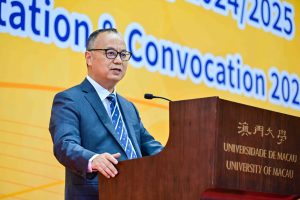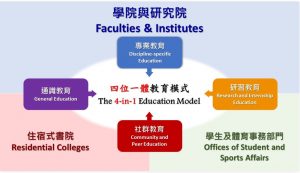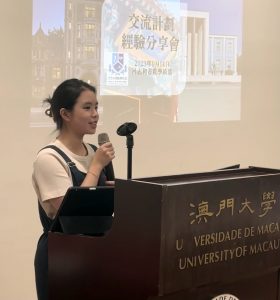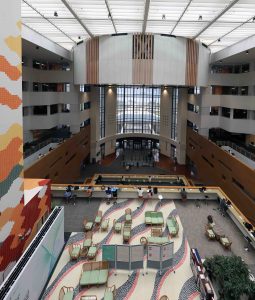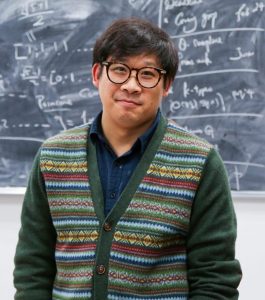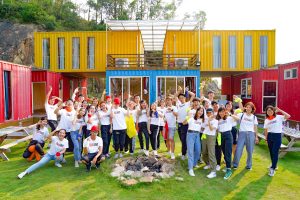The new academic year has started! For first-year students who are navigating the new learning environment at the University of Macau (UM), their primary focus is to adjust to the new pace of learning. This article provides five essential tips to prepare new UM students for university life, familiarise them with the academic resources and support provided by the university, and enable them to make effective plans for their future development.
Tip 1: Familiarise yourself with studying at UM
One of the most important tasks for first-year students is to understand what university life is about. At UM, Rector Yonghua Song is the first person to introduce new students to the concept of university education. At the convocation ceremony held at the start of each academic year, Rector Song gives a ‘lecture’ on the changes in the learning environment students experience as they transition from senior secondary school to university, including the different learning pace and requirements of university education. At this year’s convocation, Rector Song encouraged students to value their time at university, cultivate a positive and disciplined attitude towards learning, aspire to high moral standards, foster a sense of belonging to their home country, and strive to achieve their dreams.
At UM, you will experience the university’s ‘4-in-1’ education model, which integrates discipline-specific education, general education, research and internship education, and community and peer education. This holistic approach allows students to extend learning beyond their disciplines. For example, students take general education courses, have the opportunity to apply their knowledge in practical settings such as laboratories and businesses, and by living in a residential college, broaden their social networks and enhance their interpersonal skills. Therefore, you should leverage UM’s distinctive educational environment to maximise your learning experience and find joy in your academic journey.
As platforms for knowledge integration, UM residential colleges, in collaboration with faculties, are dedicated to the holistic development of students. Before the academic year begins, the master, associate master, resident fellows, and senior students of each residential college prepare to welcome new students from different majors and cultural backgrounds. At Shiu Pong College (SPC), Interim Master Prof Tam Sik Chung has prepared a ‘Letter to New SPC Family Members’. In this welcoming letter, he provides valuable tips on studying at UM and warmly reassures new students that SPC is their university home.
To provide new students with a more structured understanding of university life, UM residential colleges offer the course ‘CPED 1000 Residential College Experiential Learning’. This course outlines the university’s expectations and shows students how they can utilise their residential college to develop various competencies. Liu Jingjing, SPC associate master and assistant professor in the Faculty of Health Sciences (FHS), is one of the lecturers of the course. He emphasises that university teaching methods are significantly different from the spoon-fed approach typical in senior secondary schools. UM expects students to learn independently and manage their time effectively. He notes, ‘University life is vibrant and diverse. Learning to balance your studies and the pursuit of other academic or cultural interests is part of the educational journey.’
Tip 2: Make plans for your discipline-specific learning
The future development of each student depends on their discipline-specific learning. So, how should new students plan their learning goals for the next four years? First of all, you need to gain a clear understanding of your chosen discipline. At the beginning of each academic year, every faculty holds an orientation session for new students. During this session, the faculty dean and associate dean present the ‘Dean’s First Lecture’, which introduces the teaching philosophy and strengths of their faculty. Following this lecture, the programme coordinators of each department in the faculty provide a more detailed explanation of their programme structures and requirements. These orientation sessions are designed to help students plan their learning goals and future development.
If you still have doubts about your major after the orientation session, UM offers a mentorship scheme where each student is assigned a professor as their academic mentor. You are encouraged to utilise this scheme and consult your mentor about any academic concerns or questions you may have.
If the idea of consulting a professor is intimidating, another valuable resource is senior students in your residential college. Since they have already navigated the challenges you are facing, they can offer useful tips and share their learning experiences, including effective textbook reading strategies. The first-hand information provided by senior students can help you gain a clearer understanding of your major.
In addition, you can discuss your academic concerns with fellow students in your residential college. Engaging in meaningful conversations and exchanging views can enhance your knowledge integration ability. For example, at Lui Che Woo College (LCWC), students have taken the initiative to establish an academic section that aims to enhance students’ academic development through different activities. Nie Yingjun, a student in the Chinese and Portuguese law programme, is the academic consultant of the section. She and her peers regularly organise activities, including sharing sessions for new students, to support them in their transition to university life and improve their academic skills.
Tip 3: Make use of the abundant academic resources
Whether you are a newcomer or an experienced student, knowing how to utilise the university’s academic resources is essential to enhancing your learning effectiveness. Libraries, often considered the heart of a university, serve as a vital source of academic resources for both students and faculty. The UM Library is no exception. It offers a wealth of resources, including a database of dissertations and theses, the Macau Academic Library Alliance Hub, a Portuguese and Chinese academic resource platform, as well as e-databases, e-books, and e-journals that cover a variety of disciplines. These resources are essential learning tools. To make the most of them, you are recommended to participate in the orientations held by the library at the start of every semester, as well as its workshops and classes. These opportunities will enable you to gain a better understanding of how to effectively use these resources to achieve your academic goals.
To enrich students’ development in their disciplines, professors across faculties also provide various learning opportunities that new students should take note of. This summer, Yang Songhan, a biomedical sciences student, participated in an FHS research project and worked under Prof Hou Jiajie’s research team. Her time in the laboratory proved to be beneficial. Yang shares, ‘Prof Hou assigned us to read academic literature and report summaries to him. In addition, a senior student guided me through the experiments, significantly enhancing my understanding of immunotherapy.’
Tip 4: Navigate the journey together with your peers
Your fellow students in your faculty and residential college will be your closest companions over the next four years. Together, you will navigate both the challenges and triumphs of the education journey. Recognising the importance of a good start, faculties, residential colleges, and the student union organise two weeks of orientation and welcoming activities for new students every year. These events aim to familiarise you with the campus environment and culture, while also providing opportunities to build your social network. While faculties focus on students’ academic development, residential colleges emphasise the development of team spirit. To achieve this, LCWC uses sports activities to develop students’ sense of belonging to the university.
‘Students come from a variety of backgrounds and each has a different personality. Sports can act as their common language,’ says Chao Kuok Fai, LCWC associate master and assistant professor in FHS. ‘By training together, competing, and sharing ideas, students will find it easy to make friends. As LCWC’s motto goes, “We are family”.’
If you want to pursue interests beyond your faculty and residential college, consider joining one of the UM student associations. These student associations represent a distinctive aspect of UM culture. With more than 100 student groups spanning academics, practical skills, arts, and sports, there is something for everyone. By joining an association that aligns with your interests, you can effectively utilise your spare time, collaborate with like-minded peers, and grow together as you chase your dreams.
Tip 5: Create your career roadmap
Although you are just beginning your university life, you should start thinking about your future development. In this regard, UM residential colleges offer a career planning service for new students. This service helps students gain a better understanding of their personality and interests, which in turn enables them to identify a suitable career path by the time they graduate. Moreover, every resident fellow is certified as both a Global Career Development Facilitator and a Beisen Career Facilitator, ensuring a standardised career counselling process for students. Every new student has the opportunity to meet individually with a resident fellow, who provides professional counselling services and helps students effectively express themselves. These personalised counselling sessions aim to help students discover and recognise their strengths, thereby guiding them towards a suitable career path.
Developing a career roadmap entails a continual process of exploration. In addition to listening to alumni insights to broaden your understanding of possible career paths, you can also discuss any challenges you encounter with a resident fellow. Prof Liu Jingjing points out that career counselling does not provide a one-time solution to students’ doubts about their career development. It is important for students to engage in regular self-reflection as well. He notes, ‘It is normal if you can’t find the answer right now. However, after four years of learning in your faculty and residential college, you will see the answers gradually emerge.’
Text: Kelvin U, UM Reporter Wang Chuyue
English translation: Bess Che
Photos: Editorial Board, with some provided by the interviewees
Source: My UM Issue 135

